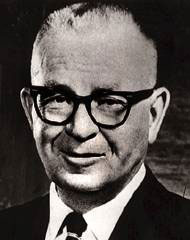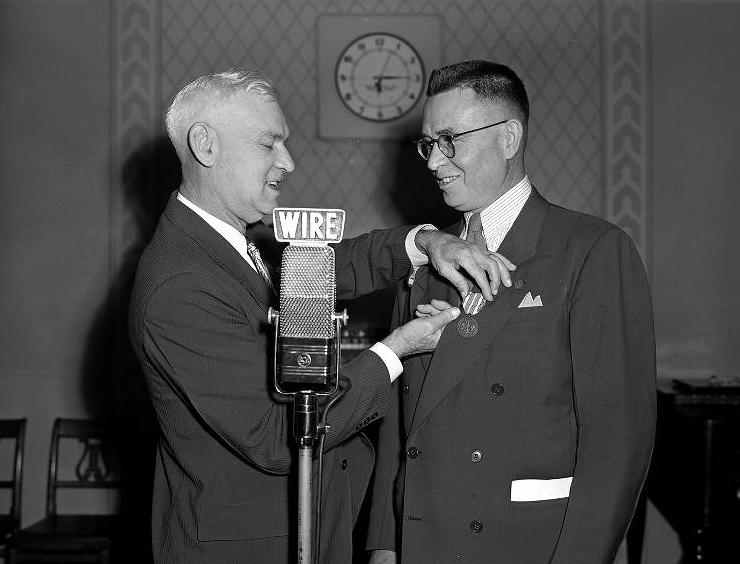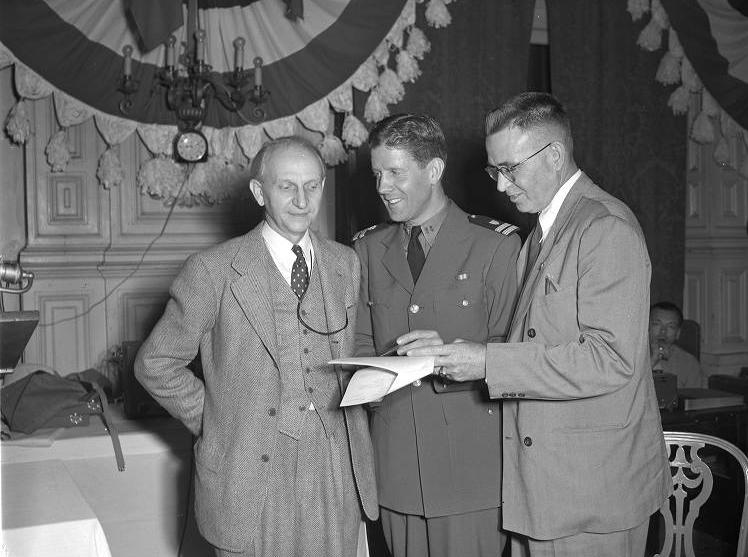
Photo info ...
Credit: Indiana Journalism Hall of FameView Source
(May 3, 1889-June 23, 1975). Born in Ulysses, Kansas, Eugene C. Pulliam wielded significant influence in Indianapolis after World War II as the publisher of the state’s two largest daily newspapers. In the 1880s, his father, Irvin B. Pulliam, was earning a comfortable living not far from Indianapolis in Danville, Illinois. Converted to Christianity, he was called to the mission field in western Kansas by the Methodist church. His son, Eugene, came to Indiana to attend the church denomination’s school, DePauw University, where he and other students started Sigma Delta Chi. Now the Society of Professional Journalists, it became the largest journalism organization in the nation. Pulliam also became a college correspondent for the during his time at DePauw.
In 1912, after a year as a reporter at the , Pulliam purchased the in Kansas, where he became the youngest publisher of a daily newspaper in the nation. He married first wife, Myrta Smith, a former college classmate that same year. They had one son, , who was born on September 7, 1914.
In 1915 Pulliam sold the and returned to Indiana where he purchased the . Myrta died in 1917. Pulliam married Martha Ott, from Franklin, Indiana, in 1919. He had two daughters with his second wife, Martha Corrine and Helen Suzanne. His eldest daughter Martha married James Cline Quayle. Former vice president Dan Quayle was their son.
Pulliam sold the in 1923 and bought the . From Lebanon, he began buying and selling newspapers all over the country, purchasing at least 50 newspapers during his lifetime. The Great Depression slowed his ambitions to own and manage several large newspapers, but the entrepreneurial experience prepared him for opportunities during and after World War II.
In Lebanon, Pulliam met Nina Mason, who worked for him at the . Pulliam divorced his second wife, Martha, in 1940 and married Mason in 1941 (see ). From thereon, the couple worked together as a team in the newspaper industry.

Pulliam purchased the Indianapolis Star in 1944 along with the Muncie Star, then bought the in 1948. In 1946, he also purchased the and in Phoenix, which was then a small state capital of 65,000 people. He later sold many smaller newspapers to people who had worked for him, leaving his own company, Central Newspapers, Inc., with newspapers in Indianapolis, Phoenix, Muncie, and Vincennes.
While buying his major newspapers, he began traveling the globe in an effort to report to readers how the world had changed. His visits to more than 75 countries included several stops in Turkey, where one series he wrote contributed to the 1958 overthrow of the government headed by Prime Minister Adrian Menderes. His travels also convinced him that big government, whether fascist or socialist, was a threat to the freedom that Americans had fought to preserve in World War II.

His conservative political philosophy, concern for community welfare, and a desire for government free of political corruption had a significant impact on Indianapolis and Phoenix. The conservative emphasis of his editorial pages affected Indiana and Indianapolis political races, since the support or opposition of his newspapers could make the difference in close elections. His afternoon began a campaign for countywide government in 1954, along with supporting downtown improvements, airport expansion, and a convention center. For stories detailing police corruption, the won the just before his death in 1975.
In 1974, Pulliam started a program for young journalists finishing college. The Pulliam Fellows program, headed by editor , continued after his death, and the alumni include three Pulitzer Prize winners.
Pulliam’s philosophy is best expressed in a passage from the Bible, II Cor. 3:17, which has remained the motto for his newspapers: “Where the Spirit of the Lord is, there is liberty.”

Help improve this entry
Contribute information, offer corrections, suggest images.
You can also recommend new entries related to this topic.